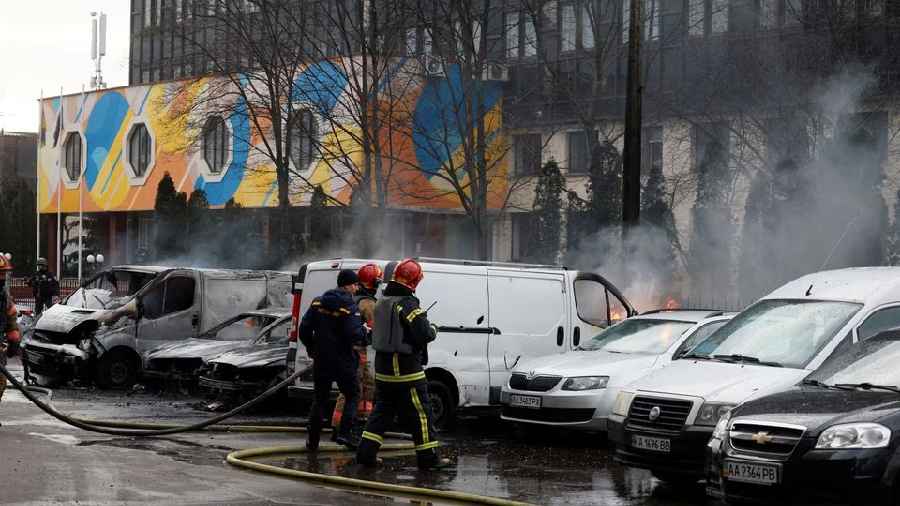Russia launched a huge wave of missile strikes across Ukraine while people slept on Thursday, killing at least six civilians, knocking out electricity and forcing a nuclear power plant off the grid.
The first big volley of missile strikes since mid-February shattered the longest calm since Moscow began a campaign to attack Ukraine's civil infrastructure five months ago.
Kyiv said it included an unprecedented six of Russia's small arsenal of kinzhal hypersonic cruise missiles, one of Moscow's most valuable weapons.
"The occupiers can only terrorise civilians. That's all they can do. But it won’t help them. They won’t avoid responsibility for everything they have done," President Volodymyr Zelensky said in a statement, describing strikes that hit infrastructure and residential buildings in ten regions.
Russia's defence ministry said it had carried out a "massive retaliatory strike" on Ukrainian infrastructure as payback for a cross-border raid last week on a village in Russia's Bryansk region.
Villagers in Zolochiv in Ukraine's western Lviv region carried a body in a black plastic bag over the rubble of a brick house completely destroyed by a missile. They put the body into the back of a white van with two others, of at least five people killed there. A dog lay curled up on a carpet in the ruins.
Oksana Ostapenko said the house belonged to her sister Halyna, whose body was still buried under the rubble with two other family members.
"They still haven’t found them. We were hoping that they’re alive. But, they’re not alive,” she said.
Another civilian was reported killed by the missiles in the central Dnipro region. Three civilians were separately reported killed by artillery in Kherson.
In the capital Kyiv, a seven-hour air strike alert through the night was the longest of the Russian air campaign that began in October.
"I heard a very loud explosion, very loud. We quickly jumped out of bed and saw one car on fire. Then the other cars caught on fire as well. The glass shattered on the balconies and windows," said Liudmyla, 58, holding a toddler in her arms.
"The child got scared and jumped out of bed," she said. "How can they do this? How is this possible? They are not humans, I don't know what to call them."
Moscow says its campaign of targeting Ukraine's infrastructure far from the front is intended to reduce its ability to fight. Kyiv says the air strikes have no military purpose and aim to harm and intimidate civilians, a war crime.
Ukrainian officials said it was the first time they had faced so many kinzhal missiles, which Ukraine has no way to shoot down. Russia is believed to have just a few dozen kinzhals, which fly many times faster than the speed of sound and which President Vladimir Putin touts as a weapon for which NATO has no answer.
Ukraine said the attack had knocked out the power supply to the Zaporizhzhia nuclear power plant, Europe's largest, severing it from the Ukrainian grid and forcing it onto emergency diesel power to prevent a meltdown.
The plant, which Russia has held since capturing it early in the war, is near the front line and both sides have warned in the past of a potential for disaster. Moscow said it was safe.
"The specialists at the plant are working quite professionally, the automation has started up," said Renat Karchaa, adviser to the CEO of Russian state nuclear power operator Rosenergoatom. "There is no threat or danger of a nuclear incident."
U.N. nuclear watchdog chief Rafael Grossi appealed for a protection zone around the plant.
"Each time we are rolling a dice. And if we allow this to continue time after time then one day our luck will run out," Grossi told the IAEA's 35-nation Board of Governors.
Kyiv, the Black Sea port of Odesa and the second-largest city Kharkiv were all hit as missiles targeted a wide arc of targets, stretching from Zhytomyr, Vynnytsia and Rivne in the west to Dnipro and Poltava in central Ukraine, officials said.
Kyiv mayor Vitali Klitschko said 40% of consumers in Kyiv were left without heat. The governor of Odesa region, Maksym Marchenko, said a mass missile attack had hit an energy facility, cutting power. Kharkiv region Governor Oleh Synehubov said the city and region had been hit by 15 strikes.
UKRAINE FIGHTS ON AT BAKHMUT
On the battlefield, the week has seen an apparent shift as Ukraine has decided to stay and fight in Bakhmut, a small city that has borne the brunt of a Russian winter offensive in the bloodiest fighting of the war.
Moscow says it is strategically important as a step to securing the surrounding Donbas region, a major war aim. The West says the ruined city has little value and Russian generals are sacrificing lives to give Putin his only victory since sending hundreds of thousands of reservists into battle at the end of last year.
Ukraine had appeared likely to withdraw from Bakhmut, but has now signalled determination to fight on, with commanders saying they are inflicting enough damage on Russia's assault force to make it worthwhile.
"Each day of the defense of the town allows us to gain time to prepare reserves and prepare for future offensive operations," said Oleksandr Sirskiy, commander of Ukraine's ground forces "The enemy loses the most prepared and combat-capable part of his army."
Yevgeny Prigozhin, head of Russia's Wagner private army which has led the fighting in Bakhmut, said on Wednesday his forces controlled all of the city east of a river through it. Russian forces have been advancing north and south of the city to cut off the Ukrainian garrison but have not yet encircled it.
Moscow, which claims to have annexed a fifth of Ukraine, says it launched its "special military operation" a year ago to combat a security threat. Kyiv and the West call it an unprovoked war to subdue an independent state.










